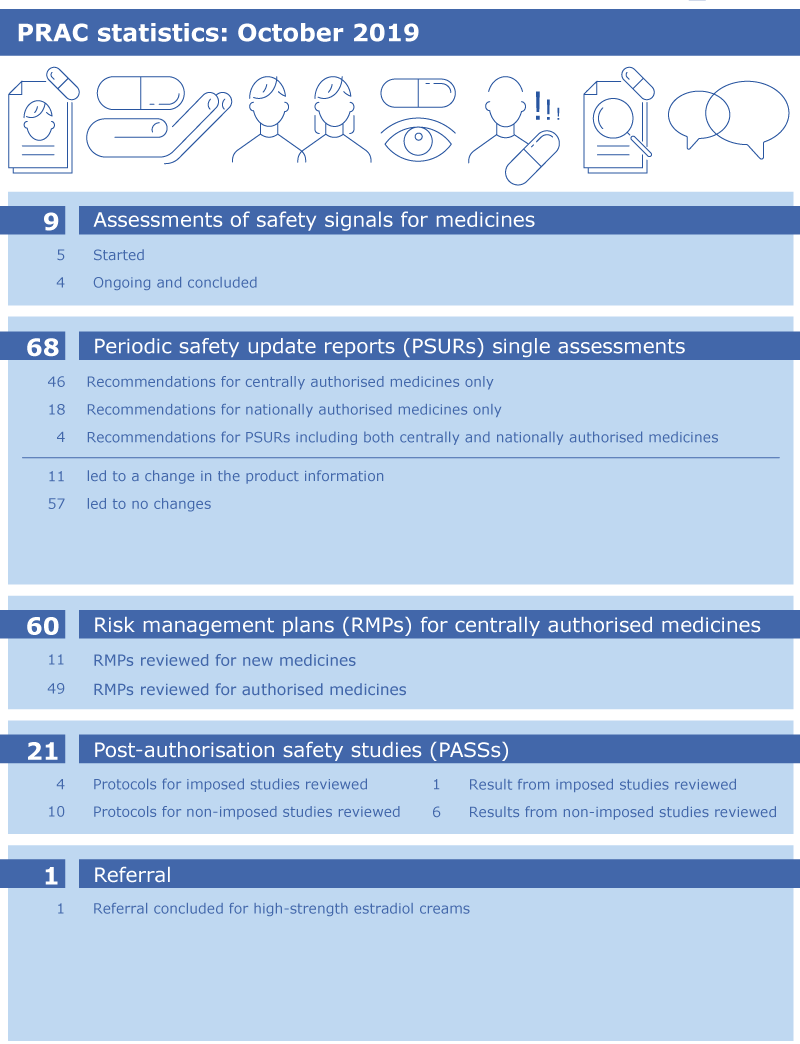Meeting highlights from the Pharmacovigilance Risk Assessment Committee (PRAC) 30 September-3 October 2019
NewsHumanPharmacovigilanceQuality of medicines
PRAC recommends four-week limit for use of high-strength estradiol creams
EMA’s safety committee (PRAC) has recommended limiting the use of high-strength creams containing 100 micrograms/gram (0.01%) of estradiol to a single treatment period of up to four weeks. This measure is intended to minimise the risk of side effects such as blood clots, strokes and certain types of cancer caused by estradiol absorbed into the bloodstream from creams applied inside the vagina to treat symptoms of vaginal atrophy in women who have been through menopause.
The PRAC has reviewed all available data on the safety and effectiveness of high-strength estradiol-containing creams, including on the amount of estradiol in blood. These data showed that in postmenopausal women who had used these creams, the levels of estradiol in the blood were higher than normal postmenopausal levels.
The prescribing information for these creams will be updated with the new recommendations. A warning that the medicine is to be used for a single treatment period of up to 4 weeks only will be placed on the outer and inner packaging, and the size of the tube will be limited to 25 grams to prevent use for longer than recommended.
This review was initiated in April 2019 at the request of the European Commission, following a ruling by the EU Court of Justice that partially annulled the conclusions of a previous PRAC review of these medicines in 2014 on procedural grounds. Although the Court of Justice did not question the scientific conclusions, the partial annulment meant that some of the measures taken to minimise the risk were invalidated.
More information is available below.

Glossary:
|
Procedure |
Status |
Update |
|---|---|---|
| Article-31 procedure: Cyproterone-containing medicinal products | Under evaluation | PRAC continued its assessment |
|
Article-31 procedure: Fluorouracil and fluorouracil related substances (capecitabine, tegafur and flucytosine) containing medicinal products |
Under evaluation |
PRAC adopted a list of experts for the ad-hoc inter-Committee Scientific Advisory Group on Oncology (SAG-O). |
|
Article-20 procedure: Lemtrada |
Under evaluation |
PRAC adopted a list of outstanding issues (LoOI). |
|
Article-31 procedure: Leuprorelin-containing depot medicinal products |
Under evaluation |
PRAC continued its assessment |
| Article-20 procedure:Picato | Under evaluation | PRAC continued its assessment |
| Article-20 procedure: Xeljanz | Under evaluation | PRAC adopted a list of outstanding issues for marketing authorisation holders and a list of questions for the ad-hoc expert group |